Read the Winning Entries in the 2021 HWC Flash Photo Fiction Contest!

For the Fall 2021 Howe Writing Center (HWC) fiction contest, we invited Miami student writers to use their pen as a camera to give us a slice of life, a flash of fancy, a moment of misery, or an instance of insight based on a series of provided images. We received many excellent submissions and are grateful to have read them all. A team of writing center consultants and staff took part in the judging process, factoring in authors’ creative works and their reflective notes.
Em Updyke was awarded first-prize winner for her piece “Family Flower Bed" which explores the relationship of two sisters and how to preserve the beauty of another.
For Sam Fouts, whose “Howling Bones” earned second-prize honors, the prompt led to reflection on death and mortality.
Dalanie Beach, third-place winner, found the spaces between identity and the afterlife in their piece "Liminal Space."
Valarie Senkowski, the staff choice winner, reflected on the metaphor of the journey in “Dramamine."
International student, Charles Xie, awarded an honorable mention, wrote a piece in three acts. They explored what happens under the moon when two strangers meet in "Travelers."
Read the winning entries below, along with reflections from the authors.
First Prize: Em UpDyke, The Family Flowerbed
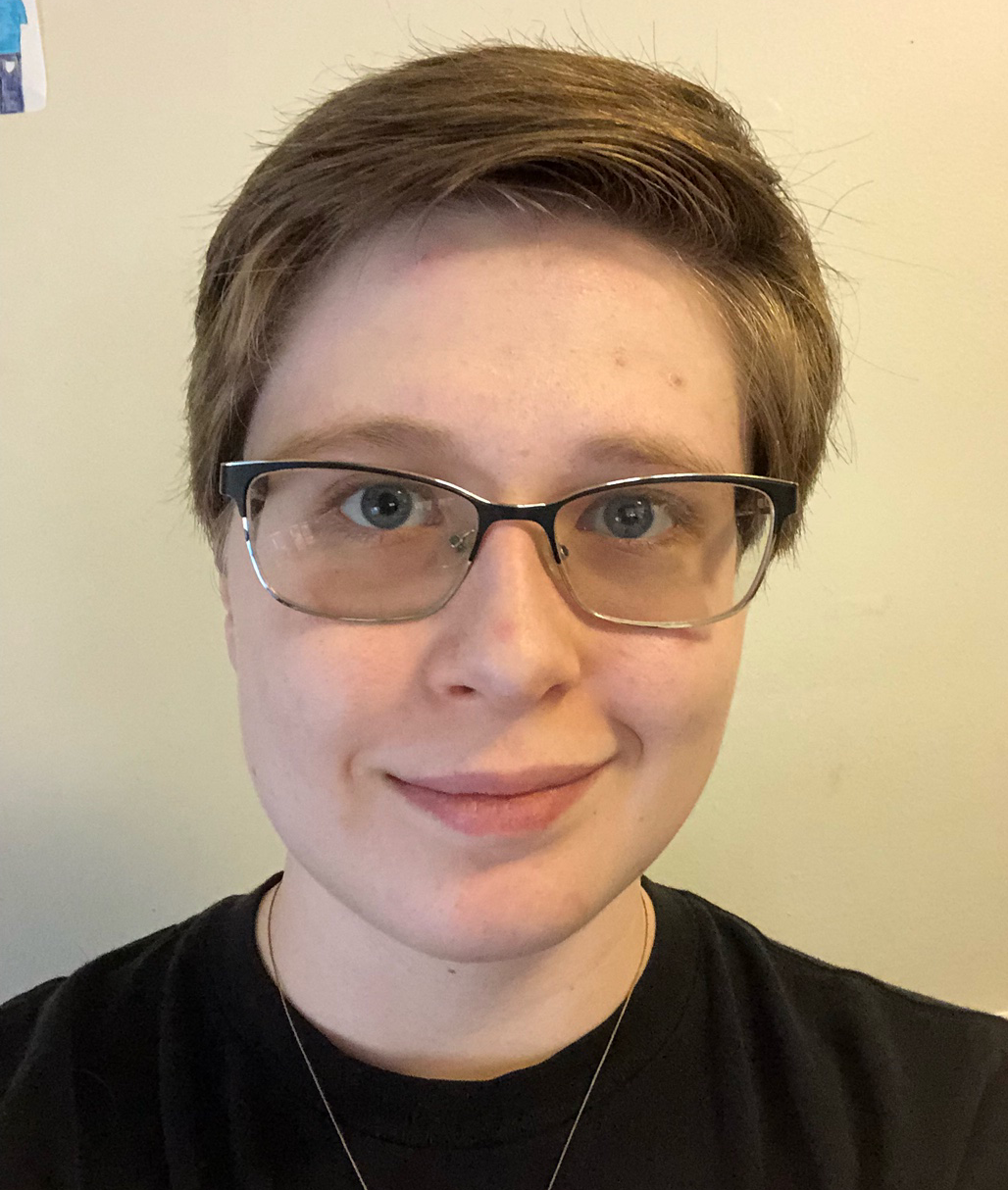
When looking through the photos, I saw the one of the skeleton and immediately thought, "it looks like someone got buried alive" and I ran with that. I listened to songs about murder and possessiveness and came up with the idea of an older sister that would do anything to protect the younger. The idea here is that the main character killed her parents years ago to protect her sister from them, then realizes that the only way to protect her sister is to "preserve her beauty" forever. I researched flower symbolism to create the garden where it is implied her parents are buried as well. Instead of typing the story out, I used voice to text to feel more natural with the flow of the story. This made editing a challenge and I had to take breaks, but it was worth it.
Read, The Family Flowerbed
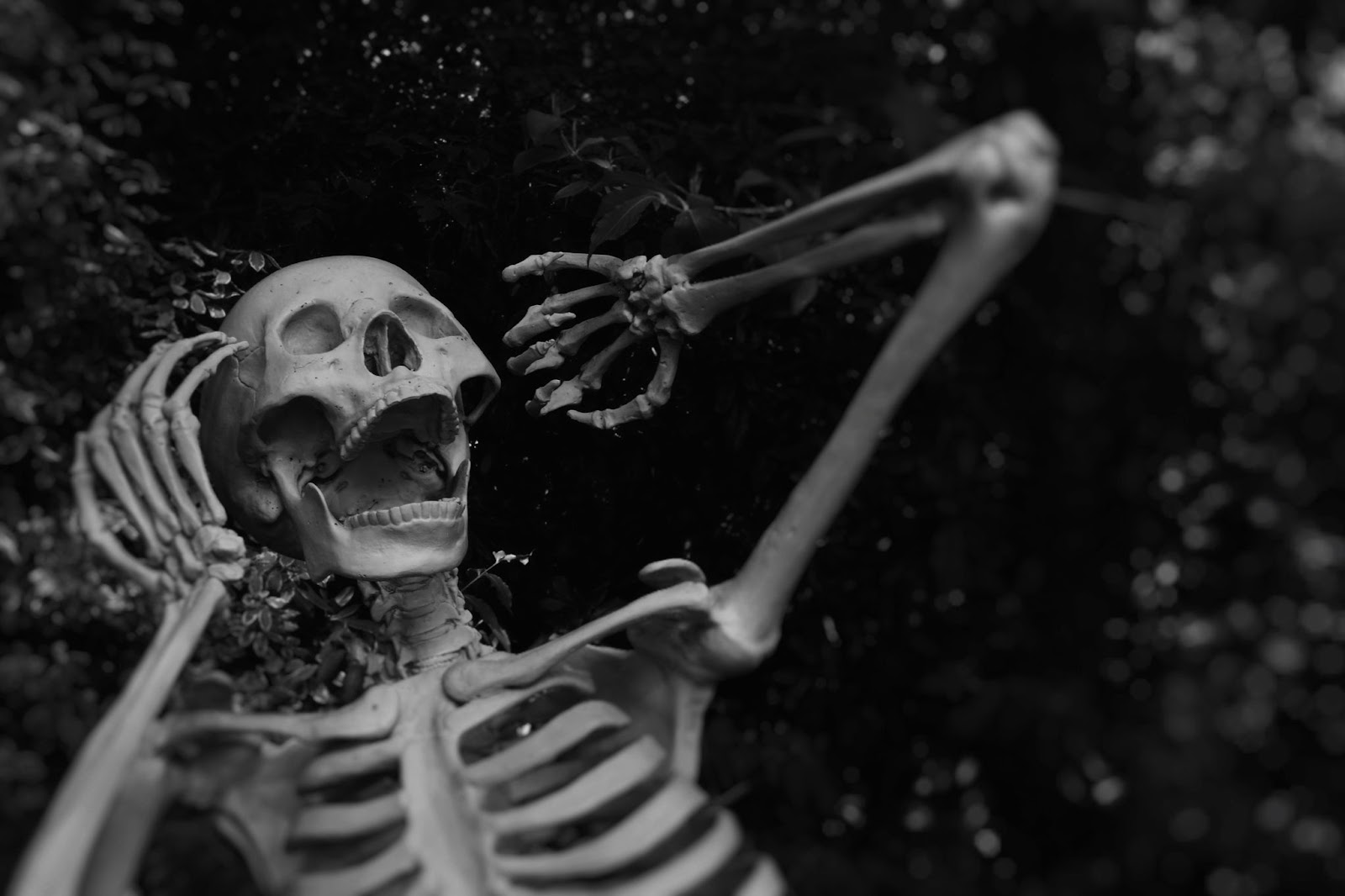
It has been one year since I last saw my sister. Everyone keeps telling me that she's gone, that she's dead. But the last time I saw her she was sleeping, so she must still be resting. Now on that anniversary, I find myself thinking about her and the night I last saw her. Every night since our parents died, I tucked her into bed. I always start with her feet, making sure that they were warm and cozy before covering her body in warm, thick blankets so that she couldn’t feel the harsh chill of our poorly insulated home. I remember a month before she went missing, she started coming home from dance class with bruises. Whenever I asked her about it, she always made excuses, like she had tripped or had run into the door. The day before she disappeared, I came back 20 minutes before class ended to see what was happening. The teacher stood by as these kids pushed my sister to the ground and made fun of her stained hand-me-down tutu. I remember they called her an orphan with a crazy sister, claiming that one day my sister would kill them all. I knew the rumors around town were that I killed my parents all those years ago, but I swear I didn't, even if my father was violent and my mother had a sharp tongue that grew sharper with liquor. I even planted flowers for them in my garden; Black-Eyed Susans and narcissus flowers, reminding me who the flowers are for every time I go outside and smell the wet earth. My sister used to play in the garden, but I asked her not to. I don't want anything to happen to those flowers; I worked so hard to cultivate them and get the perfect mix of soil. If it makes me crazy to care about the garden that is my only reminder of parents who never seemed to care, of people who were meant to protect us but never did, then I guess I must be. But seeing my sister that day with tears streaming down her face in front of a teacher that somehow cared less than our mother, I had a feeling I would be adding new flowers soon. That night, I made my sister a special drink of warm milk and temazepam. I'd seen just how rough her day was and knew that she would need help to rest. An hour later, she fell asleep in my arms to the sound of old cartoons and the smell of popcorn. I carefully carried her to the bed and tucked her in. I started with her feet, making sure that they were well covered. I moved up to her torso, covering her body in a thick layer of soil. I had wondered to myself that night, would a few feet of dirt be enough to keep her warm, to keep her safe? Regardless, I pressed on, looking at her beautiful face one last time before I covered that too. Such a beautiful soul deserved only the best decorations for her bed, so all could see just how much I love her. I gently planted morning glory seeds over her bed where she lay resting, and I knew that she would be safe from those kids, those bullies. They would never insult her again, just as my father would never raise his hand against her and my mother would never scream at her. That night, I had said goodnight to my family for the first time in years, kissing the narcissus flowers as I said goodbye to my mother and brushed the Black-Eyed Susans as I wished for my father to rot in Hell. And gently, I prayed over the morning glories that my sister would have sweet dreams forever. Because despite what they tell you, unlike my parents, my sister was still breathing when I tucked her in.
Second Prize: Sam Fouts, Howling Bones

When I first saw the picture of the skeleton, I couldn't help but think it was laughing. These photos have a fall theme, so I'm sure the skeleton was probably screaming, but I like my head canon better. Death is often attributed with terror, but it doesn't have to be that way -- it shouldn't be that way. We don't know a thing about death other than it happens, so maybe it could be something to laugh about. Or not... But I'd rather laugh about my death -- whatever it entails -- than worry about it. It won't change the fact of my death, but it sure makes life a lot happier.
Read, Howling Bones

Neither admitted it, but when the dunes went silent, when the gunshots and screams stopped echoing between brick skeletons and they were finally left alone in their shrinking garden, both breathed a sigh of relief. Every night they built their fires bigger til the sand was stained red a mile in every direction. They drank without liability and laughed and screamed and howled in the place of wolves and coyotes whose hides and bones joined the developing desert and waited for what remained to meet them there.
What remained was they. They were man and woman. They weren’t lovers, but they joked about repopulating. Only jokes. Comedy became the language of their time, the food too. A quip for lunch; wash it down with dirty wine and you could go days without food, weeks if the laughter was hearty enough. Laughter kept the core firm, kept the spirit from leaking through cracked lips and eyes, and for the man, especially, laughter kept the mind off the past and future.
But he always had the woman to remind him.
“You don’t need a bed out here,” she said that night, brushing an arm through the dust. She was running a fever. The man, rooted under the last tree in sight, offered a chuckle and buried his head back in the leaves, but something poked him in the head. In the bone-colored light he searched the ground til his hand came across a human tooth. “I bet he’s sleeping well,” the woman laughed to herself, “come out of there and feel the sand with me.” With quivering fingers, he released the tooth and parted through the brush, taking a seat next to the woman.
“You need something?” he asked attentively, putting a palm on her forehead.
She shook her head and pushed his hand away, “Just wanted to ask you something...”
He nodded.
“Were you really a king?”
The man raked his fingers through the dust and looked at the woman. “Mhm,” he murmured. She crawled closer and peered up at him while he reached into his pocket. A hand emerged with a bundle of tattered cloth, the other began unraveling. Within the clump was a shard of polished marble, a fragment of a statue's face. The man looked down at the woman and fixed the face over his own. Seamlessly, flesh flowed into marble. Her face lit up, so did the man’s, but his smile was claimed by the dirt. A lone tear snuck under the marble.
“What’s wrong?”
He hesitated. He knew he was being selfish, but she deserved an answer. “I used to be immortal,” he said quietly, head hanging in the sky. For some time he thought the stars were immortal too, but the woman told him stars had to die for humans to live.
She looked at him and grinned, grabbing a handful of dust.
“Oh, don’t you see,” she said, releasing the dirt, “you never were.” And in the morning, she was dead. She was dust without her spirit, and the man saw no point in moving her -- though he dug a grave. Took him til dusk with his bare hands, and when it was ready, he crawled inside.
The moon’s sheen hung like a fog -- cut through him like an X-ray. It painted his skin green and ghoulish, and he was bones by midnight, arms crossed fashionably over his chest. The grief followed him into the morning, but by then he was ready to part. He wrapped the marble back up, tossed it in his place, and buried it without a marker. He’d continue to visit the grave, and the woman would try to console him. She’d stand by his side some nights, put a hand on his shoulder and say:
“It’s ok. These things take time.”
He didn’t believe her. He screamed at her, but she never left. She’d stand there and quietly laugh to herself, but the man never knew what was so funny. “What?” he’d snap at her, “What!” And she’d just shake her head and smile. But one night, when he went to grab up at the sky, his hand was bone, seared off by the starlight peering through. He turned to his side to find the woman laying next to him.
“I get it now,” he said. He’d been naked this whole time. And he laughed. Laughed at the marble crumbling off his skeleton. Died laughing, and his body fed the surrounding green til his corpse was howling bones.
Third Prize: Dalanie Beach, Liminal Space
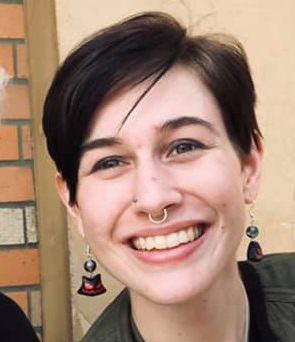
I chose the photo of two figures walking in the fog because it intrigued me and gave me a sense of anonymity and ambiguity. The story that came from this image allowed me to create a world where nonbinary identity could recognized and validated by other characters without question. The photograph also reminded me of liminal spaces and the afterlife, which are topics that have resurfaced in my own creative work of late.
Read, Liminal Space
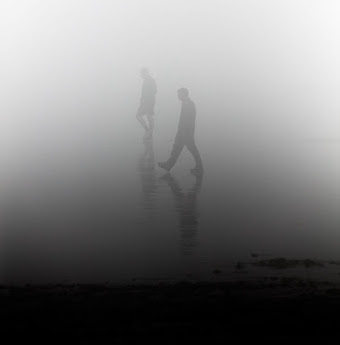
The landscape held its breath, suspended by a profound silence. A soft, white light emanated from all sides, but I could not see beyond the heavy shroud of fog wreathing around me.
I still had a body. Despite the absence of a heartbeat, it was much like the one I’d inhabited before: human, draped in black, thinnish, with short hair and lanky limbs. Only this time, it was androgynous in every sense. Not even genitals. Who needed genitals where I was headed?
I did not notice my companion at first, since our footfalls— we appeared to be walking atop a vast body of water— were synchronized. Each step made a sort of tinkling, like dewdrops hitting glass. As we came within view of one another, my mind teemed with questions, but I was afraid to shatter the silence with the sound of my voice— assuming I had one.
“You are wondering where you are.”
My companion’s voice betrayed no gender. I looked at them— also human, nondescript, and dressed in black— but with a face too obscured by the mist to reveal any specific details. “You can read my mind.”
My own voice surprised me. Like my companions, it was neither male nor female, though I recognized it immediately as belonging to what someone before once called the “inner narrator”— the voice I read and thought with but never heard aloud. It felt more real, somehow, than the voice I’d spoken with before.
“No,” said my companion. “But that’s generally the question people ask me.”
“Are you some sort of psychopomp?”
“I suppose you could say that.” I thought I caught a hint of amusement in their voice. “I hold no official title, though it is my job to guide souls through this particular stretch of liminal space.”
“Do you have a name?”
“Not here.”
I realized, suddenly, that I didn’t either. I stopped walking.
“What’s the matter?” the guide asked.
“My memories.” I groped for faces and names. Moments and emotions. But the fog seemed to have invaded my interiority and obscured them. “I’ve lost them.”
“Many of them, yes.”
I felt the beginnings of a yawning, terrible grief swelling in my chest. Before it could swallow me, my companion bridged the distance between us. The guide’s hand fell on my shoulder, and the emotion dissipated like vapor, leaving me numb and curiously empty.
“Do you wish to retain a few memories?”
“Please,” I whispered.
“It could complicate things in the hereafter,” the guide warned. “A part of you will dwell in the before, as a ghost of sorts, until you are forgotten. Those who know the ‘you’ that you were before will gain some comfort, by way of these traces, but you I’m sure you can see how these scattered bits of memory and emotion will stall your renewal of self.”
“You mean I leave a part of my soul behind if I want to remember my loved ones? And I will have to wait longer before my soul is reincarnated?”
“The soul is a dead metaphor, and it is not so much reincarnation as it is renewal.” The guide explained things like a patient teacher. “Additionally, waiting cannot take place without linear time. But if this is how you understand the situation, it is close enough to truth.” Having said this, they continued walking, their footfalls sending concentric circles rippling across the surface of the lake with each delicate touch.
I followed, confused and hopeful. “I want to remember.”
“Alright.” Abruptly, the guide spun around and pressed a hand the color of deep space against my forehead. “I shall open your library of experience. Take only what you can carry.”
An explosion of colors and scenes and sounds. Faces and names. Fear and hope and pity and love and joy and grief and— it was too much. An entire lifetime crowding my mind.
“My children!” I cried. “Let me know my children.”
The guide removed their hand. I collapsed on the lake, hot tears streaming down my cheeks as their names returned to me. I closed my eyes to see their faces more clearly, felt my body sinking gently into the lake, and heard the words of the guide as if from beneath a dome of glass: “You have chosen the role of guardian,” before my body disappeared completely.
Staff Choice: Valerie Senkowski, Dramamine
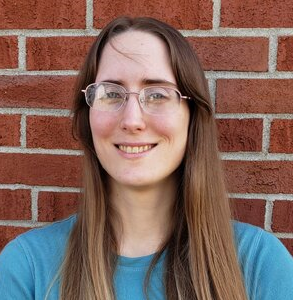
I chose the photo of the tree-lined road because it resonated with me as a metaphor for the academic journey. The photo is beautiful and inspiring, the ideal of a road trip. A road trip can be exciting, but also cramped and draining, and becomes more so the longer one is on it. So too might one consider the pursuit of a degree. Totally worth it, in moderation, for the right people, at the right time, for the right reasons. Thus, the overarching plot structure of the piece is beginning: Discomfort, Middle: Examination, End: Conclusion: I’ve been driving too long. Sometimes in life, we need to recalibrate, and examine gritty feelings. Especially if we are getting motion sick in the process.
Read, Dramamine
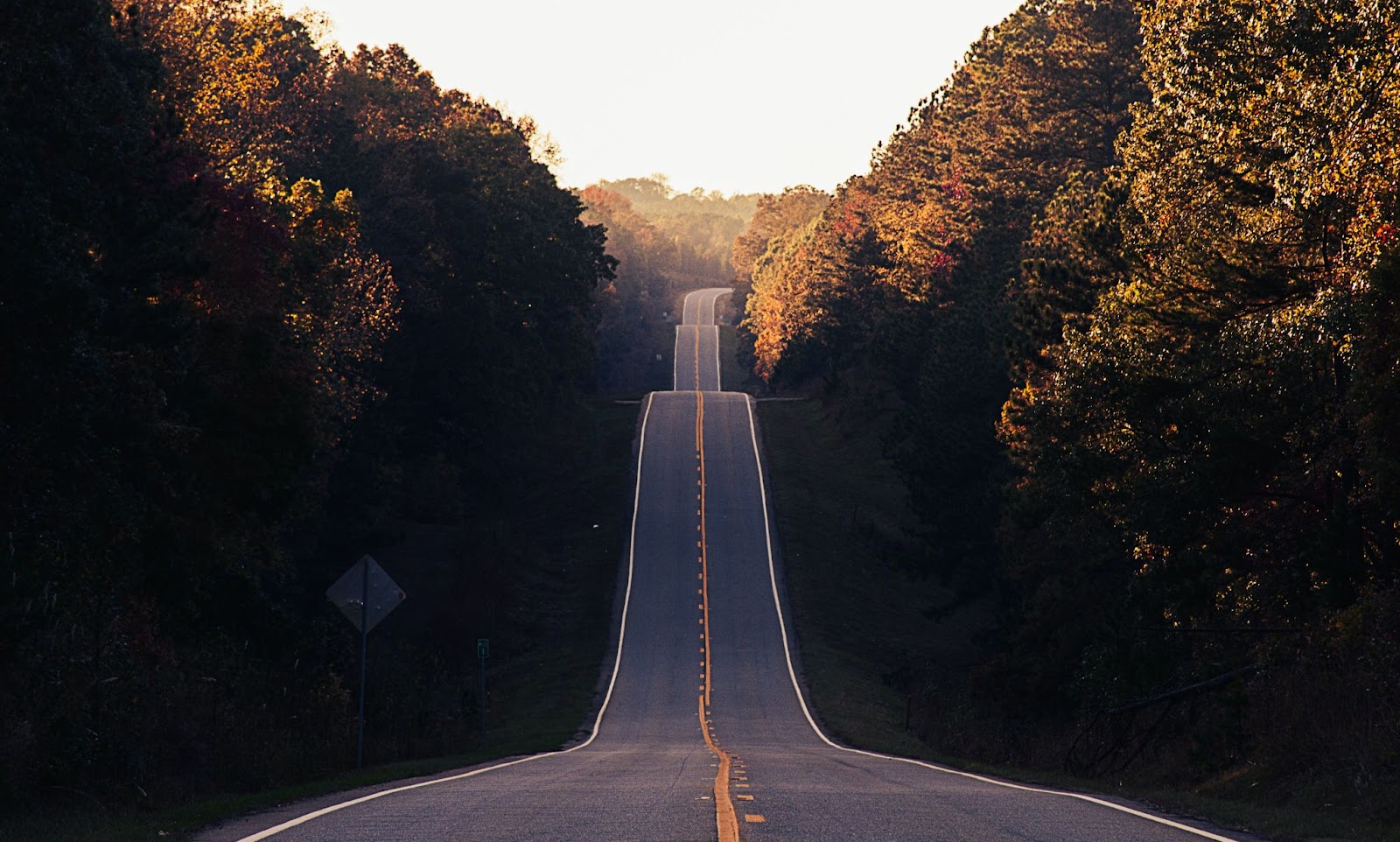
Disheveled in the driver’s seat. Craving a shower, a coffee, a stretch. Would the radio be preferable to the silence? Nothing feels right. I wait for the sun to rise as I crest a hill. Up and down.
I feel my body. Dry mouth, stiff neck. The seat beside me is empty. I did not take the proper care in packing, in planning. There is no safe place to rest along this road, nothing to sate my thirst, no way to unfold my limbs. My head pounds. Not enough caffeine? Too much caffeine? I’m not sure anymore.
So early. Nobody to call. Nobody to talk to. Nothing to talk about. Nothing to say.
Thickened woods part in flames of yellow, brown, and red. How long had I been driving without seeing their brilliance? How long had I been on autopilot, moving forward unthinking, unfeeling, unknowing? What else had I missed? Does it even matter? I’m not here for the trees.
Queasy. What am I here for?
Eyes ahead. Drawing in breath after breath. Blasting the air conditioner, rolling down windows, seeking relief. Distract myself. Displeased at shoddy workmanship, tracing my eyes along the curvatures of lane markings like wood grain. Blotched marigold paint.
So much potential. The road could have been laid so much nicer, so much neater, such that everyone who drove upon it could have relished its smooth and even application. Perhaps it once was pristinely made and well-maintained, the craftsmen praised and well-compensated for their efforts. As it stood, to my eyes, a roll of discounted ribbon with crooked patterning. Perfectly serviceable, but ugly. Unwanted at the end of the season, marked down.
Down.
Down on myself. Disappointed. Disgusted by my lack of progress. Disillusioned with how long the trip is taking me. All the shortcuts that turned into dead-ends. All the rerouting. The hours of numbing, slogging, stifling sitting. Odometers that reset at each milestone of the journey, and even more milestones yet unreached. All for what?
I know where I am going, but I’ve long forgotten why. I’ve been driving too long.
Honorable Mention: Charles Xie, Travelers

The photo I chose is the first one, a full moon in the dark night. It gave me a lot of imagination. What kind of place could be under this moon? A desert? It looks like the weather is already chilly, so an image appeared in my mind that there are three men sitting around a campfire. What will they do? I assumed that two of them have known each other for a long time, and one is a stranger. What does the stranger have to say to blend in with them and gain their trust? Then I have the basic structure of the story, but I still need an open ending that can either surprise or impress the reader. I did a brainstorming in the HOWE writing center, then found out I can write my story with three acts, like in a play. This helped me complete my flash fiction.
Read, Travelers
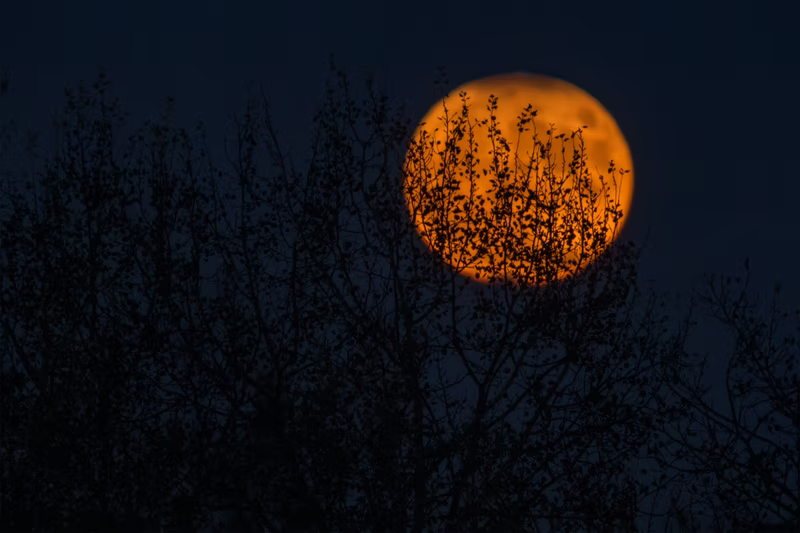
Two men were driving on the road. John is a teacher, he was assigned to an elementary school in the westernmost mountainous area of the country, and Allen drove him there. They had drove four days from their hometown, the easternmost island of the country, to this place now.
“John, how far is it to your school?” Allen glanced at the rearview mirror while holding the steering wheel.
“Let me see…” John took out the map.
“Stop please!” said a loud voice outside the car.
They stopped the car and a man appeared. “My name is Ali, could you give me a ride?” Alan and John agreed, although they were not entirely sure about this stranger in front of them.
-- Later at night--
This is a darkening night in late autumn, the whole desert was invisible except the glare of the dazzling full moon. Under the sky, these three travelers were warming themselves by a campfire.
“From your accent, you are from the south, aren’t you?” John asked Ali.
“Maynardville, Tennessee,” said Ali, “You must have lost your way here, but there’s nothing to worry about, I know the way out.” – He slowly opened his water bottle and sipped – “I've been to this place six times.”
“Six times? What do you do?”
“I traveled around this country on a motorcycle,” said Ali, “I’ve been to every corner. The mileage I biked has already exceeded a hundred and fifty thousand.”
“A hundred and fifty thousand miles is nothing at all,” said Allen quickly. “When I was a taxi driver, I drove that mileage in a year.”
“I do it for my freedom, but you do it for a living,” said Ali haughtily.
“Then how do you live?” said Allen conversationally.
“I don’t have high requirements for material things,” said Ali to Allen, while he was slicking his hair with his right hand. “when I travel, I take photos, and I write for travel journals, so I can earn royalties.”
Allen and John grinned at each other, they very admired the life attitude of this new friend. This kind of attitude that being free, not dictated to by anyone, not tied down by anything. “Did you get married? Does your family support you in doing this ‘job’?” asked John by a moment later.
Ali didn’t answer. He stared at the starry sky, lighting a cigarette. “You know what day is today?” After a momentary silence, Ali continued. “Today is the day, that Voyager 1 breaks out of the solar system, and reaches the vast universe.” At this moment, the moonlight shone on his face and eyes, making him look extraordinarily conspicuous.
“What is Voyager 1?” asked Allen suspiciously.
“It is a NASA satellite launched in 1977 to explore outer space,” John explained. “Bravo,” said Ali shortly. “My destiny, I believe, is like that satellite. The rocket carries me to outer space, to pursue my dream,” he raised his voice. “Voyager 1, after thirty-six years of flying, thirty-six years, finally goes into the interstellar space. Epic loneliness in the universe, aimed for a single reason, that is, to see outer space!” Ali said hastily. “Some people, hide in
corners for their whole lives, idolizing pop stars, but I idolize this spaceship. I call myself Voyager 2!”
“My worldview is different from yours, I prefer to become a teacher in a quiet place…” John rebutted.
“How can you have a worldview when you never view the world?” Ali interrupted John immediately. “Dude, you really should come out more often to see the world.” John didn’t speak, looking annoyed. Allen sensed the awkwardness, he planned to halt the dispute. “A man should put his career first. As for what career to do, it is everyone’s own choice,” he said.
“What’s your career?” Ali pointed at Allen.
Allen didn’t answer right away, instead, he picked up a lit branch in the campfire, lighting a cigarette with it, while Ali was watching on him. “I was a fisherman for four years, a taxi driver for three, a delivery man for two, and a kindergarten guard for one.” He continued, “during these years, I’ve built up my social network, my friends are everywhere. I’m going to start my own business in my hometown, after I send my friend to his new school.”
Ali nodded and grinned.
--The next day--
When Allen and John woke up, the only scene they saw was the immense desert. They didn’t find Ali, nor their car.

